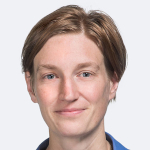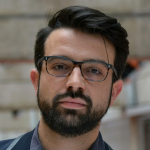Artificial intelligence plays an increasingly prominent role in music composition, performance, and production. How does this benefit or undermine musicians? Where are such developments taking us? Two young protagonists at the leading edge of AIxMusic will debate the limits and future directions of AIxMusic, tackling topics ranging from classic questions of AI takeover to therapeutic and gaming applications to discussions of lightweight deep AI, of uncertainty and unknown models and dimensions.
Moderator: Elaine Chew (UK/US)
Speakers: Dorien Herremans (BE), Philippe Esling (FR)
Biographies

Dorien Herremans (BE)
What can AI do for musical humanity and what are the big challenges?
Dorien Herremans is an Assistant Professor at Singapore University of Technology and Design, where she is also Director of Game Lab. Dorien has a joint-appointment at the Institute of High Performance Computing, A*STAR and worked as a certified instructor for the NVIDIA Deep Learning Institute. Before being at SUTD, she was a Marie Sklodowska-Curie Postdoctoral Fellow at the Centre for Digital Music at Queen Mary University of London, where she worked on the project: “MorpheuS: Hybrid Machine Learning – Optimization techniques To Generate Structured Music Through Morphing And Fusion”. She received her Ph.D. in Applied Economics on the topic of Computer Generation and Classification of Music through Operations Research Methods, and graduated as a commercial engineer in management information systems at the University of Antwerp in 2005. After that, she worked as a Drupal consultant and was an IT lecturer at the Les Roches University in Bluche, Switzerland. She also worked as a mandaatassistent at the University of Antwerp, in the domain of operations management, supply chain management and operations research. Dr. Herremans’ research interests include machine learning and music for automatic music generation, data mining for music classification (hit prediction) and novel applications at the intersection of machine learning/optimization and music.

Philippe Esling (FR)
Co-creativity and challenging the limits of AI
Philippe Esling received a B.Sc in mathematics and computer science in 2007, a M.Sc in acoustics and signal processing in 2009 and a PhD on data mining and machine learning in 2012. He was a post-doctoral fellow in the department of Genetics and Evolution at the University of Geneva in 2012. He is now an associate professor with tenure at Ircam laboratory and Sorbonne Université since 2013. In this short time span, he authored and co-authored over 20 peer-reviewed journal papers in prestigious journals. He received a young researcher award for his work in audio querying in 2011, a PhD award for his work in multiobjective time series data mining in 2013 and several best paper awards since 2014. In applied research, he developed and released the first computer-aided orchestration software called Orchids, commercialized in fall 2014, which already has a worldwide community of thousands users and led to musical pieces from renowned composers played at international venues. He is the lead investigator of machine learning applied to music generation and orchestration, and directs the recently created Artificial Creative Intelligence and Data Science (ACIDS) team at IRCAM.

Elaine Chew (US/GB)
Moderator
Elaine Chew is a pianist and researcher at the CNRS – UMR9912 / STMS Laboratory (IRCAM) in Paris, France, where she is Principal investigator of the ERC projects COSMOS: Computational Shaping and Modeling of Musical Structures and HEART.FM: Maximizing the Therapeutic Potential of Music through Tailored Therapy with Physiological Feedback in Cardiovascular Disease. She is also Visiting Professor of Engineering at Kings College London. Previously, she was Professor of Digital Media at Queen Mary University of London, where she was affiliated with the Centre for Digital Music and founded the Music, Performance and Expressivity Lab. Prior to that, she was a tenured Associate Professor at the Viterbi School of Engineering and the Thornton School of Music at the University of Southern California, where she was the inaugural Viterbi Early Career Chair and founded the Music Computation and Cognition Lab. Her research has been recognized by the PECASE and NSF CAREER awards in the United States, as well as fellowships from Harvard’s Radcliffe Institute for Advanced Study, and has been supported by the ERC, EPSRC, AHRC, and NSF.


